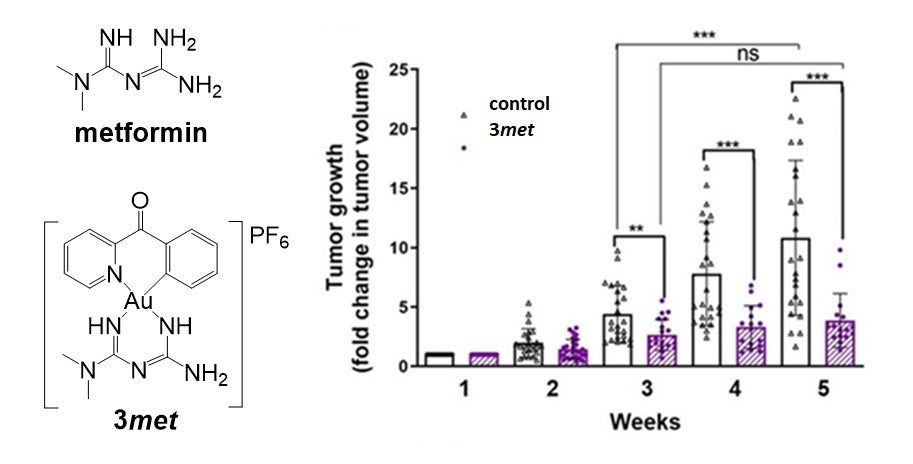Treating aggressive breast cancer with an anti-diabetic drug
ANG Wee Han (Group Leader, Chemistry) April 21, 2021NUS researchers developed an approach to target highly resistant triple-negative breast cancers (TNBCs) by interfering with their energy production using cytotoxic gold-metformin prodrugs.
Metformin is a widely prescribed “over-the-counter” medication for Type 2 diabetes. There is some evidence that patients taking metformin for a long time have significantly reduced risk of developing cancer. However, despite well-characterised anticancer effects and the low cost of metformin, its use as an anticancer agent has serious drawbacks. Metformin is poorly taken up by cells. In order to achieve therapeutic concentrations, it has to be taken repeatedly in high doses, which may cause serious side effects in cancer patients.
A team of researchers led by Prof ANG Wee Han from the Department of Chemistry, National University of Singapore and Prof Maria BABAK from City University of Hong Kong devised an approach to chemically conjugate metformin, as well as its analogue phenformin. This is achieved by using a gold-based active molecular fragment to improve bioavailability and to achieve synergistic action of the two key components (metformin and gold molecules). By taking advantage of the electrochemical activity of the gold-based molecule, the team successfully delivered metformin into cancer cells with high selectivity. The anticancer activity of the lead drug candidate developed by the team named 3met, was found to be more than 6,000 times higher when compared to metformin.
Prof Ang said, “TNBCs represent an especially dangerous subset of breast cancers with the poorest prognosis and limited treatment options. However, this particular aggressiveness of TNBC cells is related to their increased dependence on glucose and lipids, which provide additional energy to sustain rapid cancer growth. Since our drug candidates interfered with energy production in the cancer cells, we hypothesised that TNBCs might be particularly responsive to such treatment.”
The research team injected the drug candidate into murine models having breast tumours at their nipple region and monitored the growth of the tumours (see Figure). They found that the growth of tumours in a drug-treated group completely stopped after three weeks, indicating the unique anticancer potential of the drug candidate. A patent application has been filed on this discovery. The research team is actively working on the development of other efficient drugs for the treatment of chemo-resistant cancers.

Figure shows the effects of gold-metformin drug candidate 3met on aggressive breast tumour growth in vivo. Growth of breast tumours in murine models from week 1 (before treatment) presented as a fold change in tumour volume. Starting from week 2, the tumours became palpable and their volume was measured using calipers on a weekly basis. No significant tumour growth was observed after week 3 in a drug-treated group (purple colour). Chemical structures of metformin and 3met are given on the left. [Credit: Angewandte Chemie International Edition]
Reference
Babak MV*; Chong KR; Rapta P; Zannikou M; Tang HM; Reichert L; Chang MR; Kushnarev V; Heffeter P; Meier-Menches SM; Lim ZC; Yap JY; Casini A; Balyasnikova IV; Ang WH*, “Interfering with Metabolic Profile of Triple Negative Breast Cancers Using Rationally-Designed Metformin Prodrugs”, Angewandte Chemie International Edition DOI: 10.1002/anie.202102266 Published: 2021.


